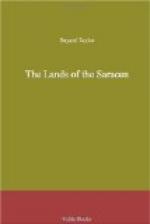The guide was waiting for us beside a spring, among the trees. He was a tall youth of about twenty, with a mild, submissive face, and wore the dark-blue turban, which appears to be the badge of a native Syrian Christian. I found myself involuntarily pitying him for belonging to a despised sect. There is no disguising the fact that one feels much more respect for the Mussulman rulers of the East, than for their oppressed subjects who profess his own faith. The surest way to make a man contemptible is to treat him contemptuously, and the Oriental Christians, who have been despised for centuries, are, with some few exceptions, despicable enough. Now, however, since the East has become a favorite field of travel, and the Frank possesses an equal dignity with the Moslem, the native Christians are beginning to hold up their heads, and the return of self-respect will, in the course of time, make them respectable.
Mount Tabor stands a little in advance of the hill-country, with which it is connected only by a low spur or shoulder, its base being the Plain of Esdraelon. This is probably the reason why it has been fixed upon as the place of the Transfiguration, as it is not mentioned by name in the New Testament. The words are: “an high mountain apart,” which some suppose to refer to the position of the mountain, and not to the remoteness of Christ and the three Disciples from men. The sides of the mountain are covered with clumps of oak, hawthorn and other trees, in many places overrun with the white honeysuckle, its fingers dropping with odor of nutmeg and cloves. The ascent, by a steep and winding path, occupied an hour. The summit is nearly level, and resembles some overgrown American field, or “oak opening.” The grass is more than knee-deep; the trees grow high and strong, and there are tangled thickets and bowers of vines without end. The eastern and highest end of the mountain is covered with the remains of an old fortress-convent, once a place of great strength, from the thickness of its walls. In a sort of cell formed among the ruins we found two monk-hermits. I addressed them in all languages of which I know a salutation, without effect, but at last made out that they were Wallachians. They were men of thirty-five, with stupid faces, dirty garments, beards run to waste, and fur caps. Their cell was a mere hovel, without furniture, except a horrid caricature of the Virgin and Child, and four books of prayers in the Bulgarian character. One of them walked about knitting a stocking, and paid no attention to us; but the other, after giving us some deliciously cold water, got upon a pile of rubbish, and stood regarding us with open mouth while we took breakfast. So far from this being a cause of annoyance, I felt really glad that our presence had agitated the stagnant waters of his mind.




